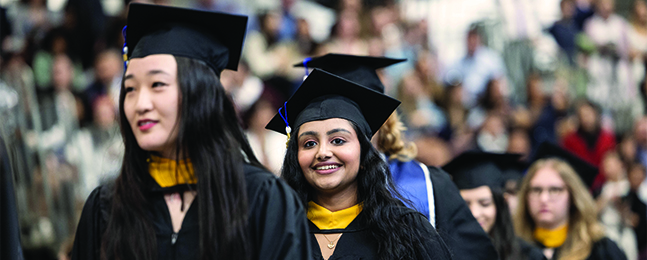Graduates Urged To ‘Drive Transformative Changes’
The university celebrates its 72nd Commencement, filled with pageantry and emotion.

Dan Holmes
by Jarret Bencks
On Sunday, May 21, Brandeis held Commencement exercises for more than 1,700 undergraduate and graduate students in the Gosman Sports and Convocation Center.
In a redesign of the traditional ceremonies schedule, immunologist Drew Weissman ’81, GSAS MA’81, P’15, H’23, keynoted an undergraduate ceremony in the morning, and Pulitzer Prize-winning historian Annette Gordon-Reed addressed graduate students at their own afternoon ceremony.
Weissman, a research professor at the University of Pennsylvania’s Perelman School of Medicine, whose mRNA discoveries underpin COVID-19 vaccines, received an honorary Doctor of Science, as did his research partner, Katalin Karikó, H’23. Gordon-Reed, H’23, and real estate developer/philanthropist Donald Soffer ’54, H’23, each received an honorary Doctor of Humane Letters.
In his address, Weissman urged his audience to “embrace the power of collaboration and diversity, for it is through these connections that we spark innovation and drive transformative changes. It is critical, as scientists and citizens, to ensure we are a force for good.”
In 2005, Weissman and Karikó discovered that by engineering a modified version of messenger RNA and developing a system to deliver it, the immune system could be tricked into thinking the body is infected with a virus and, in response, produce antibodies to create at least partial immunity (see story).
Their breakthrough ultimately led to the development of effective COVID-19 vaccines.
“We never imagined its proof of concept would be a vaccine to address a once-in-a-century global pandemic,” Weissman said of their finding. “We did, however, immediately grasp the enormous potential of this technology […] to develop new treatments and cures for many different diseases. This is why we never gave up developing mRNA, even though we hit every possible roadblock, including lack of funding and dismissal by scientific publications.”
In the afternoon ceremony, Gordon-Reed, who won the 2009 Pulitzer Prize in History for her book “The Hemingses of Monticello,” reminded graduates that, in the face of anti-intellectualism, their work is more important than ever.
“Although it has been commonly observed that there is a strain of anti-intellectualism in the United States,” she said, “I believe that the stronger tradition has been in favor of the idea of improving oneself — and, thus, improving the country — through dedication to study and hard work.”
All told, 884 bachelor’s degrees were awarded, and the Graduate School of Arts and Sciences awarded 268 degrees; the Heller School for Social Policy and Management, 232 degrees; Brandeis International Business School, 273 degrees; and the Rabb School of Continuing Studies, 114 degrees.
